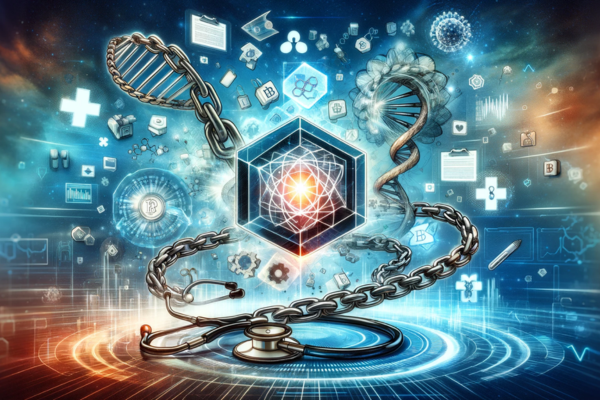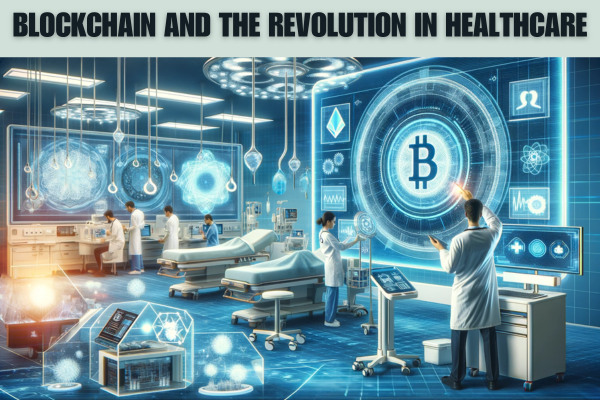Blockchain technology has been making waves in various industries, and the healthcare sector is no exception. With its potential to revolutionize the way data is stored, shared, and accessed, blockchain has the power to transform the healthcare industry as we know it. In this article, we will explore the impact of blockchain on healthcare and delve into some of the most promising blockchain applications in the field of health. From improving data security and interoperability to streamlining processes and enhancing patient care, the potential of blockchain in healthcare is truly revolutionary. So, let’s dive into the world of blockchain and discover how it is shaping the future of healthcare.
Table of Contents
Blockchain and the Revolution in Healthcare
Blockchain technology has been making waves in the financial world for its potential to revolutionize the way we handle transactions and store data. But its impact is not limited to just the financial sector. In fact, blockchain has the potential to transform the healthcare industry as we know it.
So, what exactly is blockchain? In simple terms, it is a decentralized digital ledger that records transactions in a secure and transparent manner. Each block in the chain contains a timestamp and a link to the previous block, creating a chain of blocks that cannot be altered or deleted. This makes it an ideal platform for storing sensitive data, such as medical records.
One of the biggest challenges in the healthcare industry is the lack of interoperability between different systems and providers. This often leads to delays in treatment and errors in patient care. With blockchain, all medical records can be stored in a secure and standardized format, accessible to authorized parties in real-time. This not only improves the efficiency of healthcare delivery but also ensures patient privacy and security.
Moreover, blockchain technology can also facilitate the sharing of medical data between different healthcare providers, eliminating the need for patients to carry physical copies of their records. This can be especially beneficial in emergency situations where time is of the essence.
But the potential of blockchain in healthcare goes beyond just data storage and sharing. It can also be used to track the supply chain of pharmaceuticals, ensuring the authenticity and safety of medications. This can help prevent the circulation of counterfeit drugs, which is a major concern in many parts of the world.
Another exciting application of blockchain in healthcare is the use of non-fungible tokens (NFTs) to represent ownership of medical data. This means that patients can have control over their own data and can choose to share it with researchers or healthcare providers for a fee. This not only empowers patients but also creates a new revenue stream for them.
In addition, blockchain technology can also be used to streamline the process of insurance claims and reduce fraud. By creating a transparent and immutable record of all transactions, it becomes easier to detect and prevent fraudulent activities.
The potential of blockchain in healthcare is immense and it is already being explored by various companies and organizations. With its ability to improve data security, interoperability, and efficiency, it is set to revolutionize the healthcare industry and provide better care for patients.
In conclusion, blockchain technology is not just limited to the financial world. Its potential to transform the healthcare industry is immense and it is only a matter of time before we see its widespread adoption. As an enthusiast of blockchain, finance, and NFTs, it is exciting to see how this technology will continue to shape the future of healthcare.

Blockchain Applications in Health
Blockchain technology has been making waves in various industries, and the healthcare sector is no exception. With its decentralized and secure nature, blockchain has the potential to revolutionize the way health data is stored, shared, and accessed.
One of the main challenges in the healthcare industry is the lack of interoperability between different systems and databases. This often leads to fragmented and incomplete health records, making it difficult for healthcare providers to have a comprehensive view of a patient’s medical history. Blockchain technology can address this issue by creating a unified and immutable ledger of health data that can be accessed by authorized parties in real-time.
Moreover, blockchain can also improve the security and privacy of health data. With traditional systems, sensitive information is vulnerable to cyber attacks and data breaches. However, blockchain’s decentralized structure and encryption techniques make it nearly impossible for hackers to tamper with the data. This is especially crucial in the healthcare industry, where the confidentiality of patient information is of utmost importance.
Another potential application of blockchain in healthcare is in the management of pharmaceutical supply chains. By using blockchain, the entire supply chain process can be tracked and verified, ensuring the authenticity and safety of medications. This can help prevent the distribution of counterfeit drugs and reduce the risk of medication errors.
Furthermore, blockchain technology can also facilitate the sharing of research data among different institutions. This can lead to more efficient and collaborative research efforts, ultimately benefiting the development of new treatments and cures.
The use of blockchain in healthcare is still in its early stages, but it has the potential to bring significant improvements to the industry. As more and more organizations and governments recognize the benefits of this technology, we can expect to see further developments and implementations in the near future. With its ability to enhance data security, interoperability, and collaboration, blockchain is poised to transform the healthcare sector and improve the overall quality of patient care.




